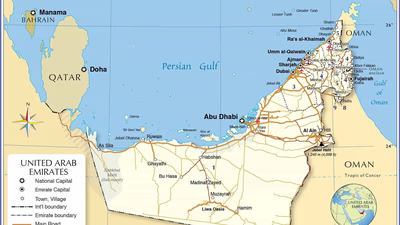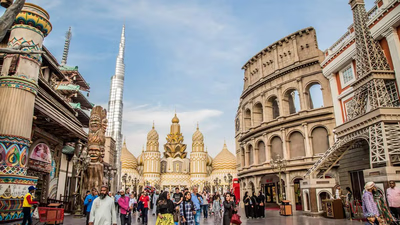
UAE: A vibrant B2B marketplace for regional trade.
The United Arab Emirates (UAE) is a country located in the Middle East, on the eastern side of the Arabian Peninsula. It is bordered by Oman to the east and Saudi Arabia to the south and shares maritime borders with Qatar and Iran. The UAE is a federation of seven emirates, which are individual states with their own rulers: Abu Dhabi, Dubai, Sharjah, Ajman, Umm al-Quwain, Ras Al Khaimah, and Fujairah. The capital city is Abu Dhabi.
The UAE is known for its rich oil reserves, which have been the backbone of its economy. However, recognizing the need for economic diversification, the country has invested heavily in sectors such as tourism, finance, real estate, and renewable energy. This strategy has helped the UAE become a global hub for business, tourism, and trade. Dubai, one of the emirates within the UAE, has gained international recognition for its stunning architecture, luxurious resorts, and vibrant lifestyle. It is a major business and tourism destination, attracting millions of visitors each year. Abu Dhabi, the capital, is known for its cultural landmarks, including the Sheikh Zayed Grand Mosque and the Louvre Abu Dhabi.
The UAE is a multicultural society with a population composed of both Emiratis and expatriates from around the world. The official language is Arabic, but English is widely spoken, especially in business and tourism sectors. The UAE is also known for hosting various events, such as the Dubai Expo 2020, which showcased innovation and cultural exchange. Additionally, the country has invested in sports, hosting major international events like the Abu Dhabi Grand Prix and the Dubai Tennis Championships.
The UAE's government follows a federal constitutional monarchy system, with each emirate having its own ruler. The President of the UAE is elected by the Supreme Council of Rulers, composed of the rulers of the seven emirates. The UAE is a monarchy in southwest Asia and east of the Arabian Peninsula. The UAE is bordered by several countries and is known as an important country due to its geographical location due to its location in the south of the Persian Gulf. To make you more familiar with the UAE, we need to mention a few things.
The capital of the UAE is Abu Dhabi and the official language of this country is Arabic. Although Arabic is legally the official language of the UAE people, other languages such as Chinese, English, Hindi, and Urdu are also widely spoken in the UAE. The official religion of the UAE is Islam and about 96% of the people of this country are Muslims. The UAE is in an extraordinary economic situation and is referred to as a developing country. The UAE has the largest oil reserves in the world and its per capita GDP is equal to that of the rich countries of Western Europe. The transparency and security of the economy in this country have caused many large international companies to come to the UAE and operate in this country. The UAE is politically an absolute federal monarchy.
First, it is better to get acquainted with the different characteristics of the UAE so that we can export to Dubai with a better strategy. Geographically, the country is mostly surrounded by water. The UAE has access to the Persian Gulf on one side and the Oman Sea on the other. Saudi Arabia and Oman are two countries that have land borders with the UAE and water borders with Qatar and Iran. The climate of this country on the Persian Gulf, like other countries, is hot and dry and desert. However, its eastern regions are more temperate and mountainous.
However, only a very small part of its land can be cultivated, which has made the UAE one of the importers of agricultural and food products. Historically, the country has always been the focus of various powers, the latest example of which was Britain. After the withdrawal of Britain, it gained its independence in 1971 and is still ruled by the Al Nahyan dynasty. Thus, there are not many political parties and currents in the UAE, and the power system is quite centralized. Iran's southern neighbor is one of the most demographically unique countries. Because non-Emirati people have a larger share of the population than genuine Emirati people.
Non-Emirati people are people from all over the world who have migrated there for work, investment, and economic opportunities. Therefore, culturally and socially, we are facing a very diverse country that includes a combination of different ethnicities, religions, and cultures. The diversity of cultures in the UAE, especially Dubai, has made it easier for most people to form business relationships. The table below shows the population of the UAE in 2019 and its cultural and social characteristics.
Historically, the region that now constitutes the UAE was inhabited by nomadic tribes engaged in fishing, pearl diving, and trade. In the 18th century, the area came under the influence of the British Empire and was known as the "Trucial States" due to the treaties signed with Britain for protection against piracy. The UAE gained its independence from Britain in 1971 and was formed as a federation. The late Sheikh Zayed bin Sultan Al Nahyan, the ruler of Abu Dhabi, played a crucial role in the formation of the UAE and became its first president. Since its establishment, the UAE has experienced rapid development and economic diversification, transforming it into a modern and cosmopolitan nation.
-

The United Arab Emirates (UAE) is a federation of seven emirates located in the Middle East, known for its significant oil reserves and economic diversification efforts. The country has transformed into a global business hub, with Dubai recognized for its tourism and architectural marvels. Abu Dhabi, the capital, features cultural landmarks like the Sheikh Zayed Grand Mosque. The UAE"s economy is bolstered by sectors such as finance, real estate, and renewable energy, attracting international companies due to its transparency and security. The multicultural society comprises both Emiratis and expatriates, with Arabic as the official language and English widely spoken in business contexts. The UAE"s strategic geographical location enhances its role in regional trade, making it a vital player in West Asia"s import-export activities. Hosting major events like Dubai Expo 2020 and international sports competitions further solidifies its status as a trade advertising platform. Understanding the UAE"s unique characteristics is essential for businesses looking to engage in commodity trade or supply chain solutions within the region.
-

The UAE"s economy has historically depended on oil and gas revenues, but significant efforts have been made to diversify into sectors like tourism, finance, and technology. The government aims to create a sustainable economy by reducing reliance on petroleum exports. Dubai stands out as a regional financial center with a robust logistics network that enhances global trade connectivity. Despite diversification, oil still plays a crucial role in the economy, particularly in Abu Dhabi. The UAE ranks among the top exporters and importers globally, with strong trade ties to countries like China and India. The tourism sector has become a major non-oil income source, supported by luxury hotels and extensive development projects. The UAE actively seeks foreign investment through favorable policies and free zones that offer tax exemptions and 100% foreign ownership. This openness has fostered an environment conducive to international business growth, making the UAE a key player in global trade. "
-

The UAE has established comprehensive laws and regulations for imports and exports to facilitate trade while ensuring public health and safety. Customs duties vary based on product type, origin, and trade agreements, necessitating consultation with the Federal Customs Authority for accurate tariff rates. The UAE adheres to international sanctions, requiring compliance from all traders. Free zones offer benefits like 100% foreign ownership and tax exemptions, but regulations differ across emirates. Businesses must secure valid commercial licenses and register with the UAE Customs Office to operate. The country has a high import rate, primarily in precious metals and machinery, with specific tariffs on goods like alcohol (50%) and tobacco (100%). The UAE"s efficient trade processes make it one of the easiest countries for import-export activities in the region. Compliance with health standards is crucial for food and agricultural imports, often requiring certifications or inspections.
Intellectual property laws are robust, necessitating respect for trademarks and copyrights in trade activities. Importers must also navigate documentation requirements for customs clearance, including invoices and permits. "
-

Dubai has emerged as a pivotal international trade hub in the Middle East, particularly for Iranian traders. Its strategic location, coupled with advanced port and airport facilities, facilitates efficient import and export operations. The city is known for its diverse export activities, including agricultural products like fruits and nuts, as well as handicrafts. Exports to Dubai can be conducted via air or sea, with the latter often utilizing traditional dinghy methods due to their cost-effectiveness and speed. This method is particularly favored for non-sensitive goods that can withstand exposure to water. Despite Dubai"s economic strength, its agricultural sector is limited, leading to a reliance on imports for most summer crops from countries like Iran and Turkey. The fruit market in Dubai has become especially lucrative for Iranian exporters, with watermelon and tomatoes being among the top exported items. Overall, the trade dynamics in Dubai highlight its role as a vital B2B marketplace in West Asia. "
-

The UAE"s population exceeds 9 million, with Emiratis constituting a small fraction. The majority are expatriates drawn from diverse regions, including South Asia, the Middle East, and Western countries. This demographic diversity is fueled by the UAE"s status as a global business hub, offering numerous job opportunities in sectors like construction, finance, and healthcare. The government provides Emirati citizens with social welfare benefits and public sector employment opportunities. The population dynamics are influenced by government policies aimed at balancing the native Emirati population with the expatriate workforce. As a result, the UAE ranks fifth globally in terms of being immigrant-friendly. The country is geographically located in the Middle East and consists of seven emirates: Abu Dhabi, Dubai, Sharjah, Ajman, Umm Al Quwain, Ras Al Khaimah, and Fujairah. Each emirate has unique characteristics that contribute to the overall economic landscape of the UAE. With ongoing changes in global conditions and local policies, the demographic composition of the UAE is expected to evolve further.
-

Abu Dhabi, the capital of the UAE, is the largest emirate and serves as the political and cultural hub. Known for its stunning architecture, it features landmarks like the Sheikh Zayed Grand Mosque and Emirates Palace. Dubai, the most populous city, is a global business center famous for its luxurious lifestyle and iconic structures such as Burj Khalifa. Other emirates like Ras Al Khaimah offer outdoor activities with mountainous landscapes, while Fujairah is popular for diving due to its rich marine life. Each emirate contributes uniquely to the UAE"s economic landscape, showcasing a blend of modernity and tradition. The UAE"s diverse cities enhance its appeal as a trade platform in West Asia, attracting both importers and exporters.






